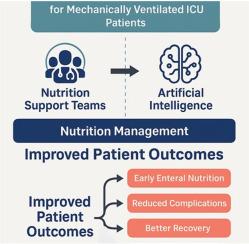评估营养支持团队的影响和人工智能在机械通气ICU患者临床结果中的作用:一项全面的综述
Q3 Nursing
引用次数: 0
摘要
本综述探讨了营养支持团队(NSTs)在重症监护病房(ICU)机械通气患者营养管理中的关键作用。营养支持对于改善危重患者的临床结果至关重要,肠内营养(EN)是首选的方法。早期肠内营养(EEN)已显示出显著的益处,可减少并发症,如感染、多器官衰竭和延长机械通气时间。该综述强调了多学科方法的重要性,其中nst在确保早期和充足的营养支持方面发挥着至关重要的作用,从而改善恢复结果。此外,还探讨了人工智能(AI)和机器学习(ML)在ICU营养管理中的整合,重点关注这些技术如何增强决策和优化营养策略。讨论了人工智能在预测喂养方案和提高护理精度方面的潜力,说明了NSTs如何利用这些进步来定制营养干预措施。该审查还解决了与在ICU环境中实施人工智能相关的挑战,包括整合障碍和改善基础设施的需求。通过评估nst的影响和人工智能的潜力,本综述强调了通过有效的营养支持可以显著改善机械通气ICU患者临床结果的多方面方法。本文章由计算机程序翻译,如有差异,请以英文原文为准。

Evaluating the impact of nutrition support teams and the role of artificial intelligence in clinical outcomes for mechanically ventilated ICU patients: A comprehensive review
This review examines the critical role of nutrition support teams (NSTs) in managing nutrition for mechanically ventilated patients in the intensive care unit (ICU). Nutritional support is essential for improving clinical outcomes in critically ill patients, with enteral nutrition (EN) being the preferred method. Early enteral nutrition (EEN) has demonstrated significant benefits, reducing complications such as infections, multi-organ failure, and prolonged mechanical ventilation. The review emphasizes the importance of a multidisciplinary approach, with NSTs playing a vital role in ensuring early and adequate nutritional support, which improves recovery outcomes. Additionally, the integration of artificial intelligence (AI) and machine learning (ML) in ICU nutrition management is explored, focusing on how these technologies can enhance decision-making and optimize nutrition strategies. AI's potential to predict feeding regimens and improve the precision of care is discussed, illustrating how NSTs can leverage these advancements to tailor nutrition interventions. The review also addresses the challenges associated with implementing AI in ICU settings, including barriers to integration and the need for infrastructure improvements. By evaluating both the impact of NSTs and the potential of AI, this review highlights the multifaceted approaches that can significantly improve clinical outcomes for mechanically ventilated ICU patients through effective nutrition support.
求助全文
通过发布文献求助,成功后即可免费获取论文全文。
去求助
来源期刊

Clinical Nutrition Open Science
Nursing-Nutrition and Dietetics
CiteScore
2.20
自引率
0.00%
发文量
55
审稿时长
18 weeks
 求助内容:
求助内容: 应助结果提醒方式:
应助结果提醒方式:


